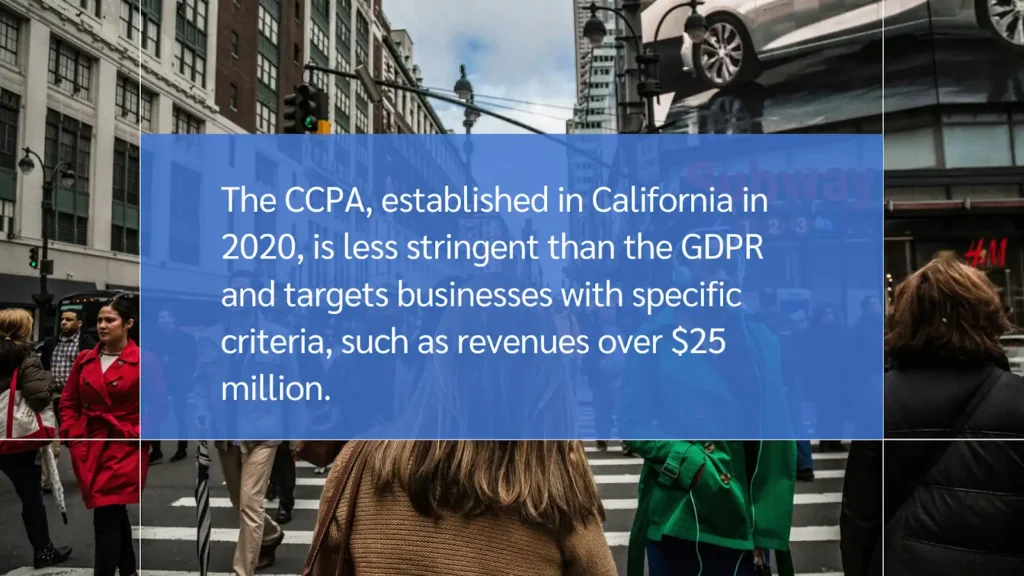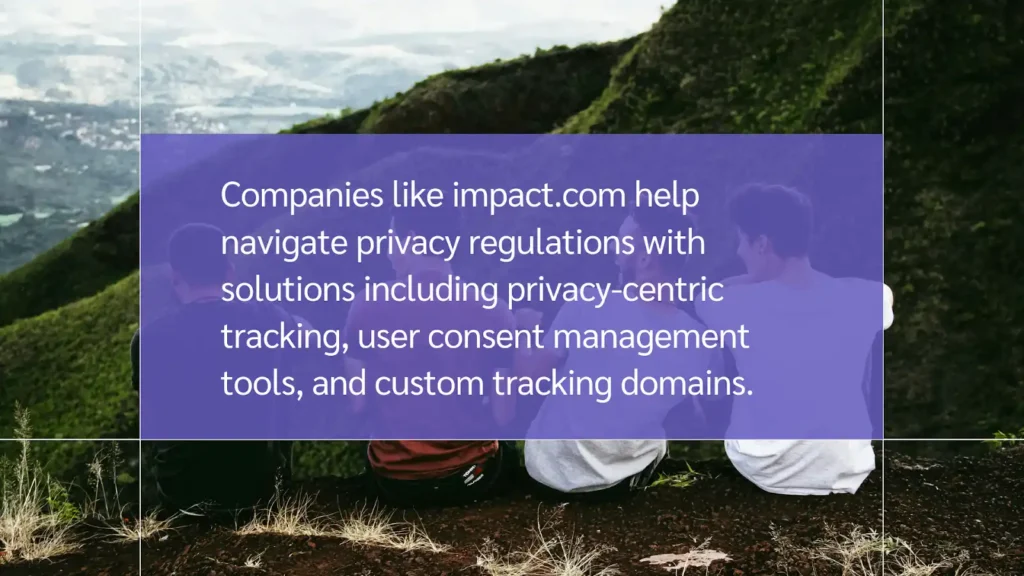Tracking is indispensable to the success of any affiliate program. Affiliate marketing thrives on effective tracking methods, which are essential for monitoring the entire affiliate process and ensuring accurate attribution of efforts. This capability not only supports the management of affiliate networks but also optimizes payment models, forming the foundation of successful affiliate programs.
Without accurate and reliable tracking, businesses risk under-crediting their channel contributions, leading partners to shift their focus toward brands that ensure proper attribution of their efforts. At impact.com, we have embraced a proactive and thoughtful approach to tracking, designed to adapt to changes in the digital marketing environment and maintain efficient tracking capabilities for our clients.
Changes in the tracking ecosystem

Significant shifts have occurred in marketing tracking in recent years. Privacy regulations such as GDPR and CCPA, browser privacy updates such as ITP, increased use of ad blockers, and the consumer shift to mobile and apps have all impacted traditional tracking methods. These changes have particularly affected other paid media channels, increasing the reliance on affiliate marketing for accurate performance measurement.
What is GDPR and CCPA?
The General Data Protection Regulation (GDPR) and the California Consumer Privacy Act (CCPA) are two pivotal privacy regulations that have significantly impacted digital marketing and tracking practices. Both laws aim to enhance personal data protection and give individuals greater control over their information.
GDPR overview:

Implemented by the European Union in 2018, the GDPR is one of the strictest data protection regulations globally. It applies to any organization processing the data of EU residents, regardless of where the company is based. Key requirements include:
- Data consent: Organizations must obtain explicit user consent before collecting or processing their personal data.
- Right to access and erasure: Individuals have the right to access their data and request its deletion.
- Data protection by design: Companies must integrate data protection measures into their systems from the outset.
- Data breach notification: Organizations are required to notify authorities within 72 hours of a data breach.
CCPA overview:

The CCPA, enacted in California in 2020, shares similarities with the GDPR but is less stringent. It applies to businesses that meet certain criteria, such as having annual gross revenues above $25 million. Key requirements include:
- Consumer rights: Californians have the right to know what personal data is collected about them and to whom it is sold.
- Opt-out options: Consumers can opt-out of the sale of their personal information.
- Non-discrimination: Businesses cannot discriminate against consumers who exercise their CCPA rights.
The impact on digital marketing and tracking:
Both GDPR and CCPA have redefined how businesses handle customer data, posing significant challenges for digital marketing and tracking:
- Data collection limitations: Marketers must now obtain clear consent for data collection, affecting how they build and track user profiles.
- Increased compliance costs: Businesses must invest in systems and processes to ensure compliance, which can be resource-intensive.
- Enhanced transparency and trust: While challenging, these regulations also offer businesses an opportunity to build trust with consumers through transparency and respect for privacy.
Adaptation strategies:

To navigate these regulations, companies like impact.com have developed solutions that respect privacy while maintaining tracking efficacy:
- Privacy-centric tracking solutions: Implementing technologies that minimize reliance on cookies and instead use server-to-server tracking to comply with privacy standards.
- User consent management tools: Providing tools to manage user consent efficiently, ensuring compliance with both GDPR and CCPA.
- Custom tracking domains: Utilizing custom domains to maintain tracking capabilities even in scenarios where standard tracking methods are blocked.
While GDPR and CCPA present challenges for tracking, they also push companies towards more ethical data practices, ultimately fostering a more trustworthy relationship with consumers. Businesses that proactively adapt will comply and potentially gain a competitive edge in the privacy-conscious market.
What is ITP?

Browser privacy updates, particularly Apple’s Intelligent Tracking Prevention (ITP), have significantly influenced digital marketing and tracking practices. These updates enhance user privacy by limiting how third-party cookies track user behavior across different websites.
Understanding Intelligent Tracking Prevention (ITP):
ITP is a feature implemented in Apple’s Safari browser, first introduced in 2017. It aims to protect user privacy by reducing the ability of advertisers and websites to track users across the web. Key features of ITP include:
- Cookie expiration: ITP restricts the lifespan of third-party cookies to as little as 24 hours, after which they are automatically deleted.
- Cross-site tracking prevention: It blocks cookies and other tracking data from being shared across websites, preventing the creation of user profiles.
- Storage access API: Websites must obtain user consent to access cookies stored in the browser.
Challenges for digital marketing and tracking:
The introduction of ITP and similar browser privacy updates poses several challenges for marketers and advertisers:
- Reduced tracking accuracy: The limitation on cookie lifespan affects the ability to track user journeys and conversion paths over time accurately.
- Attribution difficulties: ITP complicates the attribution process, making determining which marketing channels or campaigns drive conversions is harder.
- Retargeting limitations: With restricted access to cross-site tracking data, retargeting strategies that rely on third-party cookies become less effective.
The impact on data collection and user privacy
These browser privacy updates enhance user privacy by minimizing the data collected without explicit consent. However, they also require changes in how businesses gather and use data for marketing purposes.
Adapting tracking strategies:

To maintain effective tracking in light of these changes, businesses can adopt several strategies:
- Server-side tracking: Shifting from client-side to server-side tracking reduces reliance on browser cookies and provides more reliable data collection.
- First-party data emphasis: Focusing on first-party data collection ensures that businesses have direct relationships with their users, reducing the impact of browser restrictions.
- Privacy-compliant solutions: Companies like impact.com are developing privacy-centric tracking solutions that comply with browser updates while maintaining tracking capabilities.
While browser privacy updates like ITP pose challenges, they push the digital marketing industry towards more ethical data practices. By adopting innovative tracking strategies that prioritize user privacy, businesses can continue to engage with their audiences while effectively respecting privacy regulations. impact.com, for instance, is at the forefront of adapting to these changes, ensuring its clients can maintain effective marketing operations in a privacy-conscious world.
Tracking at impact.com
At impact.com, our commitment to tracking is rooted in three core goals: respecting users’ right to privacy, continuously improving tracking efficacy, and providing the best user experience possible. Our suite of tracking solutions ensures that every user click can be accurately attributed without compromising privacy or performance.
Advanced tracking options
- Universal Tracking Tag (UTT): This innovative solution bypasses third-party gateways, placing a lightweight and more secure first-party cookie on the brand’s own site. Recent upgrades have further enhanced its effectiveness.
- Direct tracking: Eliminating the need for both first- and third-party cookies, Direct Tracking attributes traffic from specific domains using predefined rules. This method was available well before major browser updates, future-proofing our clients’ tracking capabilities.
- Tracking APIs (server-to-server tracking): By not relying on browsers to store information, APIs eliminate dependency on cookies, ensuring continued tracking effectiveness as users switch between web, mobile web, and apps.
Innovative functionality to enhance tracking
- Audiences: This tool enables brands and partners to share user segments, improving targeting and personalizing offers while safeguarding user privacy.
- Custom tracking domains: Available to all clients, these domains enhance trust and prevent tracking loss due to ad blockers like Ghostery.
- Consent mode: Developed for the EU, this mode improves tracking for loyalty and rewards sites exempt from standard GDPR consent rules, boosting performance and reducing customer inquiries about rewards.
- Enhanced deep-linking: Our new technology increases conversion rates by opening the product page directly in your app, bypassing social apps’ browsers.
- Tracking efficacy: We provide transparent reporting to uncover potential issues and optimize tracking effectiveness for each program and partner.
- Precision tracking drove Stash’s 52% lead boost.
FAQ
GDPR and CCPA impose strict rules on data collection and user consent, requiring businesses to obtain explicit permission before processing personal information. This means marketers must invest in compliance systems and adjust tracking methods to ensure consumer transparency and trust.
Intelligent Tracking Prevention (ITP) limits the use of third-party cookies, reducing tracking accuracy across websites. This makes it challenging to attribute conversions and complicates retargeting efforts. Marketers need to adapt by focusing on first-party data and server-side tracking.
By proactively adapting to privacy changes and implementing ethical data practices, businesses can build consumer trust and maintain compliance. Utilizing innovative tools like those offered by impact.com can also enhance tracking capabilities, providing a strategic advantage in a privacy-conscious market.
Precision tracking drove Stash’s 52 percent lead growth
Stash achieved remarkable growth by using impact.com’s tracking solutions to optimize and expand its affiliate partnerships. With a focus on increasing app subscriptions, Stash utilized impact.com’s robust platform to efficiently recruit new partners and enhance existing relationships.
The strategic use of granular reporting tools enabled Stash to identify high-performing partners and refine its approach, leading to a 52% increase in leads. Automated recruitment and streamlined onboarding further bolstered their partnership network, cementing these collaborations as crucial to Stash’s continued success and revenue growth.
Our commitment
Tracking is complex and requires a proactive, comprehensive strategy. At impact.com, we are not content with merely reacting to industry changes. Our team is committed to identifying all potential friction points, setting clear benchmarks, and helping brands and partners improve their tracking performance. This commitment ensures that our clients remain at the forefront of effective digital marketing tracking.





